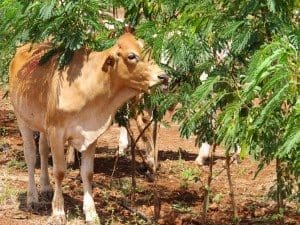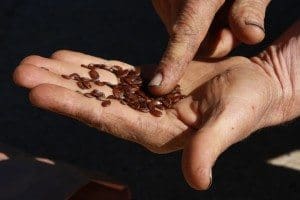Seed from a new psyllid-resistant variety of the tropical legume pasture leucaena will soon be available to commercial cattle producers, opening the way for massive productivity gains in northern Australia.
Leucaena is a fast growing perennial tree which offers one of the most productive feedbase options for northern cattle producers, but its susceptibility to attack by the leucaena psyllid (Heteropsylla cubana) has limited its adoption in high-rainfall and coastal areas.
This is set to change following the development of a new variety named Redlands, which was developed by University of Queensland with funding from Meat and Livestock Australia (MLA), and is resistant to psyllid attack.
“The Redlands variety has the potential to greatly improve the productivity of cattle operations in Northern Australia and will allow for leucaena to be planted in areas previously not possible due to psyllids,” MLA’s General Manager of On Farm Innovation & Adoption, Dr Matthew McDonagh said.
“We estimate that the new variety could open up a further 1.5 million hectares of Queensland to potential leucaena production, as well as significant areas of the Northern Territory, which could in turn produce a net benefit to the industry of $500 million or more per year.
“MLA has now signed agreements with two partners in Central Queensland, Carnarvon Pastoral Company and Leucseeds, to grow seed plots for the psyllid resistant variety, with commercial volumes of seed expected to be available for purchase within three years.”
More than 200,000 hectares of Queensland has already been planted to leucaena, with its high nutritional value improving production and profitability by adding an estimated 50,000 tonnes of liveweight gain per year worth an extra $100 million to the state’s beef production.
Dr McDonagh said leucaena not only improved growth rate of cattle, but recent research conducted by CSIRO demonstrates that cattle fed on leucaena also emit less methane.
“This is important because methane emission from cattle is essentially an energy loss out of the animal. Methane emission is carbon that is not going into muscle development. The more we can fix the carbon into the animal, the more kilograms of beef we can produce.”
Redlands was named after the Queensland Department of Agriculture and Fisheries Brisbane-based research centre where it was developed from plant breeding and germplasm research over the last decade.
It is described as a vigorous, high-yielding variety with good tree form, excellent forage quality, longevity and tolerance to grazing.
Leucaena is not only the highest grossing pasture production option for northern producers but is also considered an environmentally friendly pasture option. It has the potential to improve soil quality and soil carbon sequestration; is deep-rooted and adapted to clay soils; is drought tolerant and long-lived (>30 years); and efficiently fixes atmospheric nitrogen to the soil.


